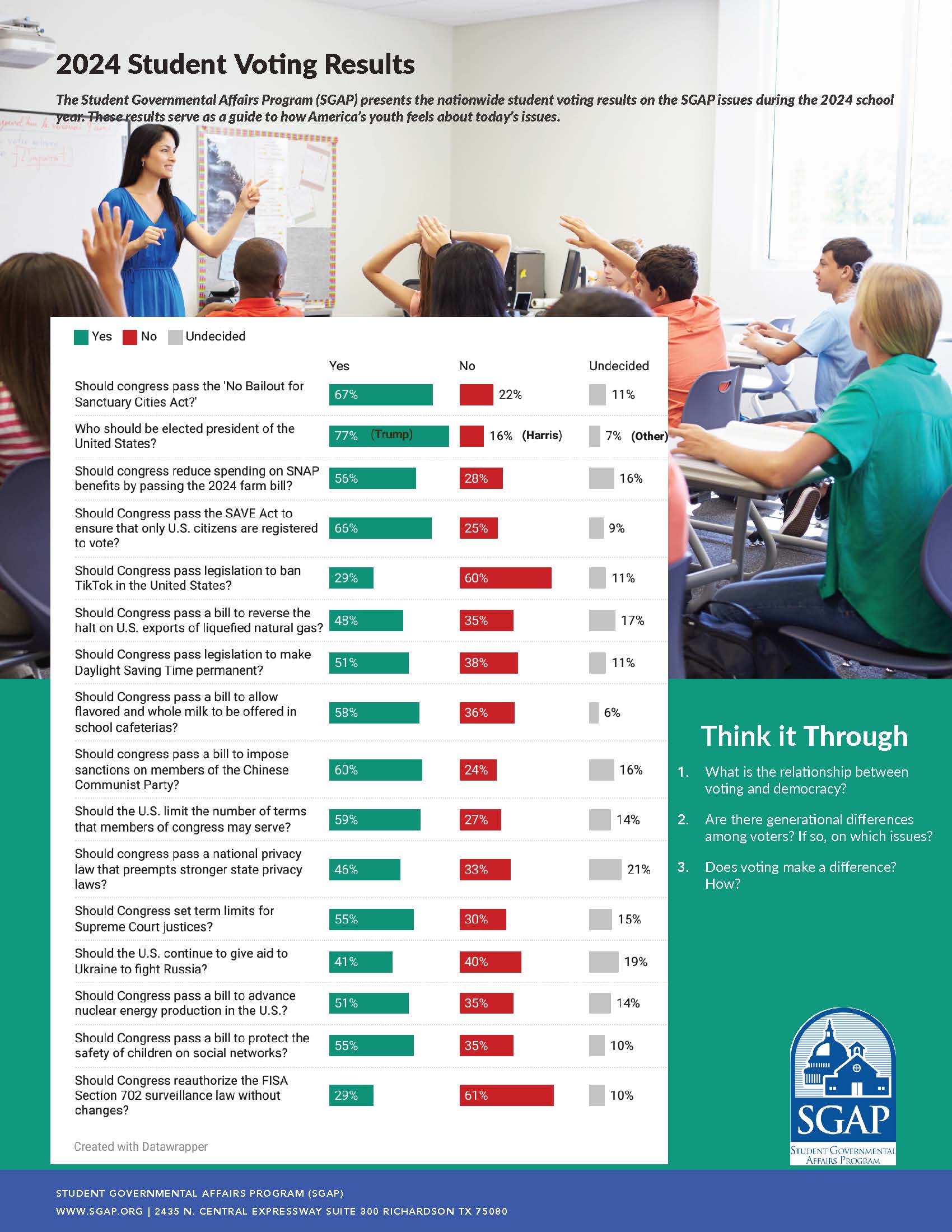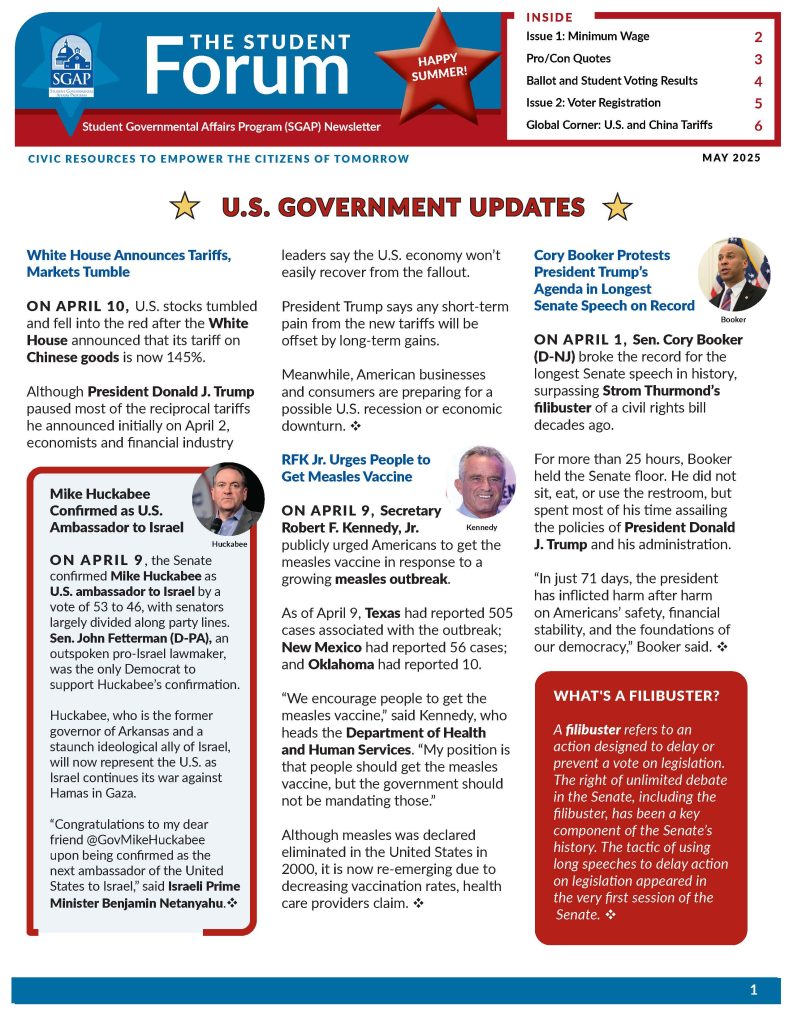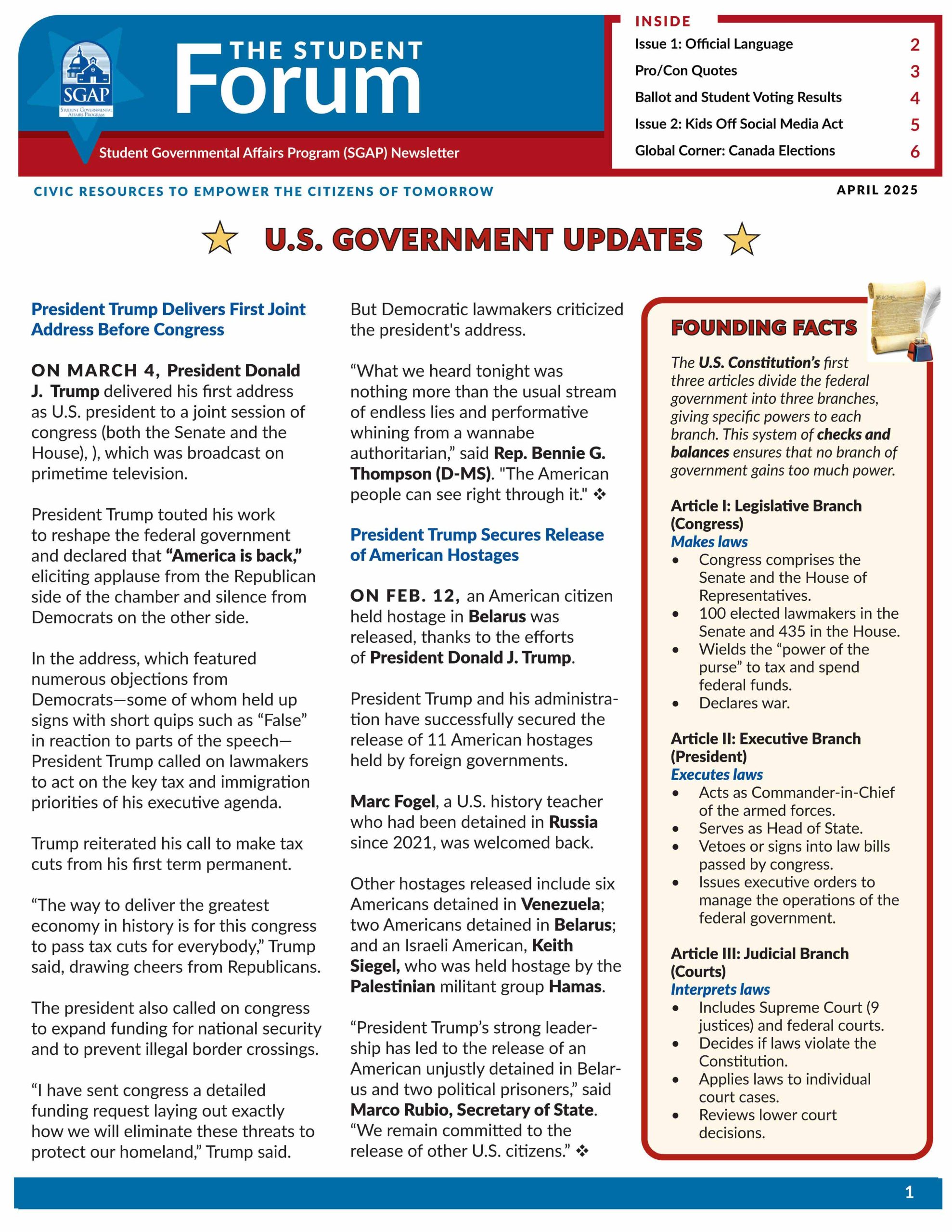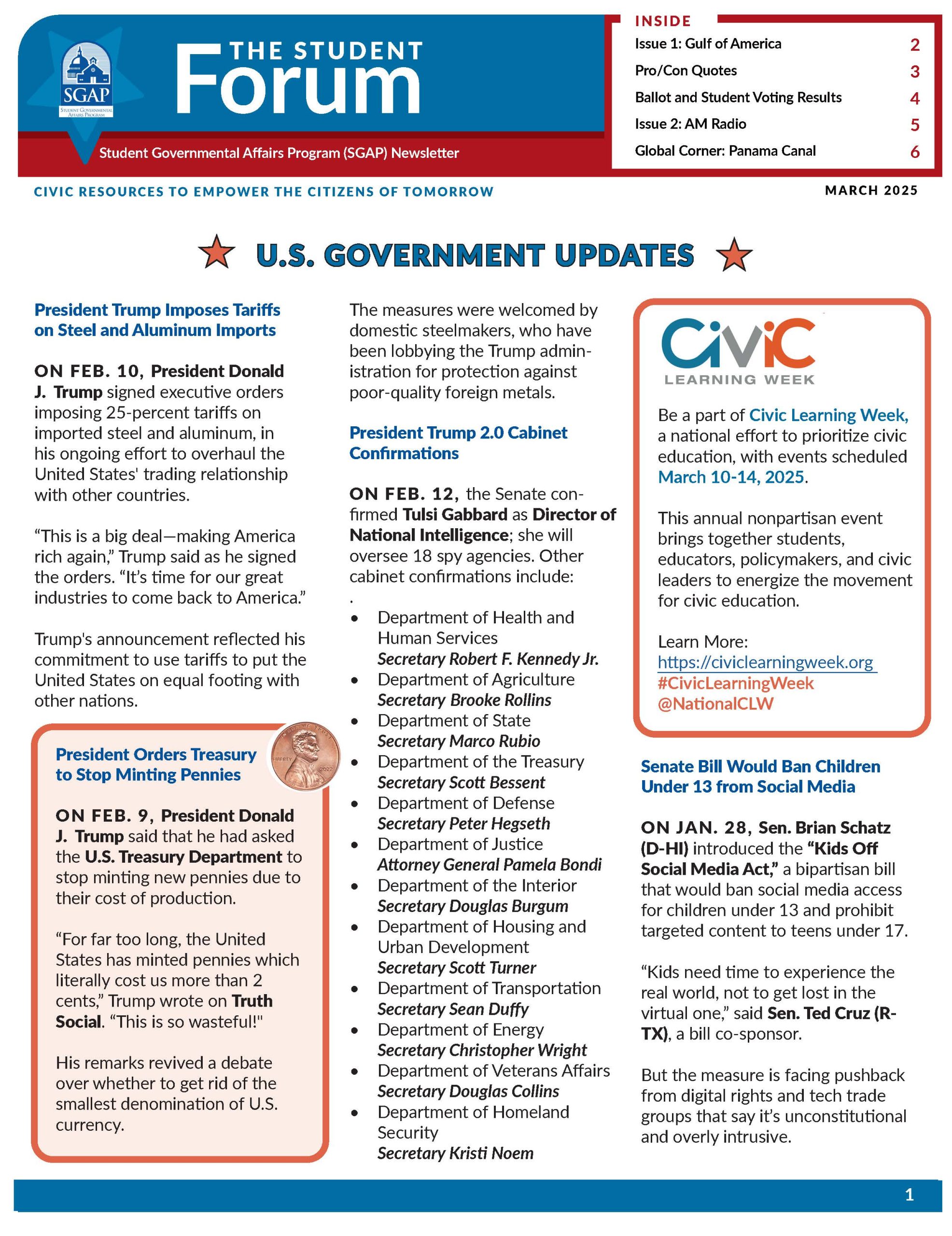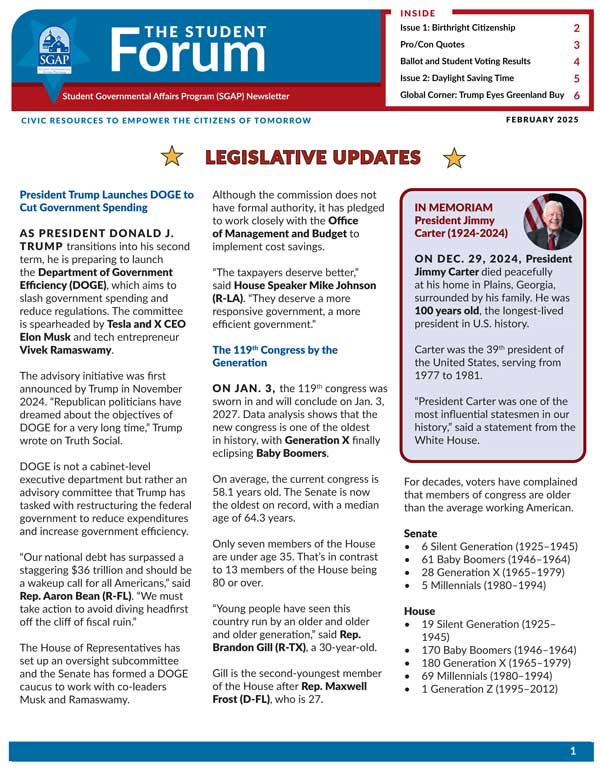2024 Impact Survey Results Infographic
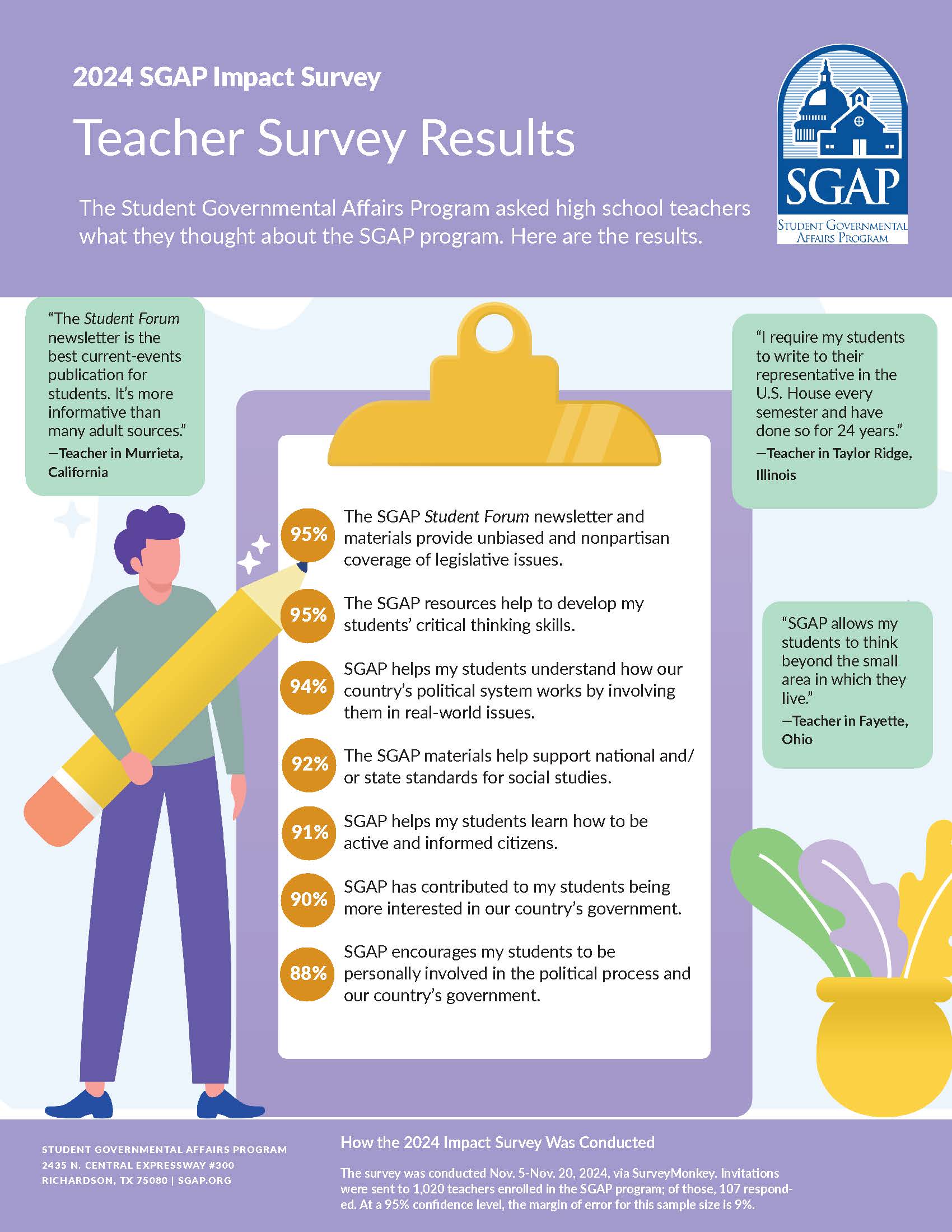
Links and Discussion Questions May 2025 – Teacher Ideas
RESEARCH LINKS

THE PUSH TO RAISE THE FEDERAL MINIMUM WAGE comes up nearly every year in congress—with Democrats typically for it and Republicans against it.
Issue 1: Minimum Wage
House.gov: “Raise the Wage Act of 2025” Bill Text
Economic Policy Institute: “Impact of the Raise the Wage Act of 2025”
Heritage Foundation: “Increasing the Minimum Wage Comes at Too High a Price”
National Employment Law Project: “Why Every Job Should Pay a Living Wage”
Wharton/University of PA: “Why Raising the Minimum Wage Has Long-term Costs”
Investopedia.com: “What Are the Pros and Cons of Raising the Minimum Wage?”
Issue 2: Voter Registration (SAVE Act)
Congress.gov: H.R.22 “The SAVE Act”
House.gov: “Rep. Roy Introduces Bill to Protect the Integrity of American Elections”
Center for American Progress: “The SAVE Act Would Disenfranchise Citizens”
House.gov: “SAVE Act Fact Sheet”
National Education Association: “NEA Urges House to Vote No on the SAVE Act”
National Conference of State Legislatures: “9 Things to Know About the SAVE Act”
DISCUSSION QUESTIONS
Issue 1: Minimum Wage
- Would an increase in the minimum wage boost consumer spending and economic growth? Why or why not?
- What are the potential negative effects of raising the federal minimum wage? Examples might include inflation, price increases, and/or jobs loss or reduced hours. Would any negative effects outweigh the positives? Why or why not?
- Imagine you are a business owner who employs workers at the current minimum wage. How might you respond to a minimum wage increase? Would you raise prices, reduce staff, or find ways to increase efficiency?
- What are the potential social benefits of raising the minimum wage, such as reduced poverty and crime?
- Is the minimum wage best addressed on a national or state level, and why?
Issue 2: Voter Registration (SAVE Act)
- If passed, the SAVE Act would require American citizens to produce documents like a passport or birth certificate to register to vote. Do you feel this measure would strengthen or weaken Americans’ voting rights? Why?
- Opponents of the SAVE Act say it is an example of congress using its authority to create needless obstacles for voters. Do you agree? Why or why not?
- The SAVE Act would upend Americans’ access to mail-in and online voter registration. How might this measure negatively impact people who live in rural areas?
- Proponents of the SAVE Act say it will preserve and strengthen the “integrity and sanctity” of U.S. elections. Do you agree? Why or why not?
- Should ballot access and voting rights be a partisan issue? Why or why not?
Student Forum Newsletter May 2025
Links and Discussion Questions April 2025 – Teacher Ideas

THE ‘KIDS OFF SOCIAL MEDIA ACT’ (KOSMA) seeks to address concerns about social media and youth mental health. But does it offer an effective solution to the problem?
RESEARCH LINKS
Issue 1: Official Language
WhiteHouse.gov: Executive Order, “Designating English as Official Language”
U.S. Census Bureau: “Most Americans Speak Only English at Home”
Linguistic Society of America: “Statement Against English as Official Language”
Cato Institute: “Immigrants Learn English: Language Acquisition Rates by Country”
Close Up Foundation: “Should the U.S. Designate an Official Language?”
Heritage Foundation: “The Need for Upholding Our National Language”
Issue 2: Kids Off Social Media Act
Congress.gov: S.278, “Kids Off Social Media Act”
The Lancet: “School Phone Policies and Their Association with Wellbeing Study”
The Verge: “Another Bill Wants to Ban Kids from Social Media”
Politico: “Bill Banning Social Media for Youngsters Advances”
OpEd: “Social Media is a Major Cause of the Mental Illness Epidemic in Teen Girls”
EdWeek Market Brief: “Fate of Far-Reaching Social Media Regulations Is Uncertain”
ITIF.org: “The Kids Off Social Media Act Misses the Mark on Children’s Online Safety”
Experian Blog: “What Is Child Identity Theft?”
DISCUSSION QUESTIONS
Issue 1: Official Language
- Do you think that designating English as the official language of the United States encourages immigrants to learn English? Why or why not?
- Those for making English the official language of the U.S. say that establishing one shared language would foster a stronger sense of national identity and unity. Do you agree? Why or why not?
- Read the arguments for and against designating English as the official language of the U.S. in the Close Up Foundation article (link above). Where do you stand on the issue? Why? Write a paragraph or two outlining your position and summarize your arguments in bullet points.
- Does designating one language (namely English) as “official” undermine values such as inclusivity and honoring various cultural heritages? Why or why not?
- What if there was only one language spoken and written by all people across the globe? Would the world be a better place? Why or why not?
Issue 2: Kids Off Social Media Act
- The “Kids Off Social Media Act” is intended to help alleviate youth mental health issues such as depression, anxiety, and suicide. Do you think the bill, if passed, would ultimately help children and teens with their mental health? Why or why not?
- Does the KOSMA bill provide the best solution to problems that may develop when youth use social media? These might include youth depression and suicide, child identity theft (see Experian link above), and other types of youth exploitation. Would you propose another solution? If so, what would that be?
- What are some of the best and worst things about using social media as a child or teen?
- How do you feel when you spend a lot of time on social media? Are there times when you wish you could stay off social media altogether? Why or why not?
- What do you think the social media platforms you use know about you? How do you feel about that?
Student Forum Newsletter April 2025
Teacher Spotlight – Jack Reavis (Muskogee, OK)
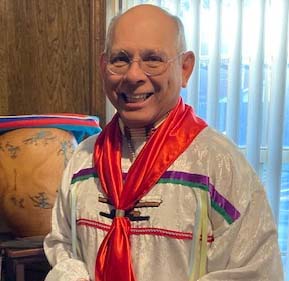
Jack A. Reavis teaches U.S. history and government to students in the Three Forks region of Oklahoma, which was a center of development in the state during the 19th century. Reavis practices Cherokee culture and beliefs.
Teacher Name: Jack A. Reavis
School Name: Muskogee High School
School Location: Muskogee, OK
No. of Years Teaching: 28 years
Subjects Taught: AP U.S. History, AP Government & Politics
Honors: Finalist for Oklahoma Teacher of the Year
As a descendant of Native American heritage, veteran social studies teacher Jack Reavis remembers how his great-grandmother and mother spoke the Cherokee language.
“My view of culture and respect for the Mother Earth and all humanity come from these two women,” says Reavis, who honors his past by practicing Cherokee culture and beliefs in the present. “The Cherokee have always stressed the importance of education.”
Practicing Native American spirituality has positively impacted his teaching philosophy and pedagogical approach. “Sometimes a hug is all a student needs, not what you are teaching,” Reavis says. “The most important thing I have learned over the years is that what I have freely given away has always come back to me seven-fold.”
Reavis teaches U.S. history and government in the Three Forks region of Oklahoma, once a thriving hub for the settlement and development the great American West. Today, the area is largely rural, which presents its own teaching challenges but also opportunities.
Rural vs. Urban Schools
Like many of the teachers who use the SGAP Student Forum newsletter and resources in their classrooms, Reavis teaches in a rural area of Oklahoma.
“In both rural and urban settings, the primary goal of the educational system is to contribute to the mental, spiritual, emotional, and physical development of youth,” Reavis says. “But a rural school that serves 250 students will not offer the same educational experience as an urban school that serves 4,500. The educational goals may be standardized but how they are realized is much different.”
Reavis believes these differences must be factored into the equation when evaluating the benefits of school choice programs, which have rapidly grown in popularity nationwide.
“School vouchers are here and they are not going away,” Reavis says. “The schools in rural Oklahoma must play the long game. If the state mandates equity, the smaller rural school districts will struggle to stay open. If these rural schools close, we will lose a vital part of our Oklahoma identity and who we are as a people.”
School Choice
School choice programs may be more functional in the urban system than rural, Reavis believes. “The busing of rural students to an urban school an hour away is not in the best interest of our students,” he adds.
How might states and communities mitigate these potential negative impacts on rural schools? Reavis suggests turning to the students themselves for their ideas and solutions.
“If we really want to resolve some of the problems that currently exist in public education, ask our young people,” Reavis says. “Turn fresh and innovative minds loose on the issues facing us. It is obvious the Boomers can’t solve or fix it. Let the young minds of today create their own future. A child shall lead the way.”
Links and Discussion Questions March 2025 – Teacher Ideas
RESEARCH LINKS
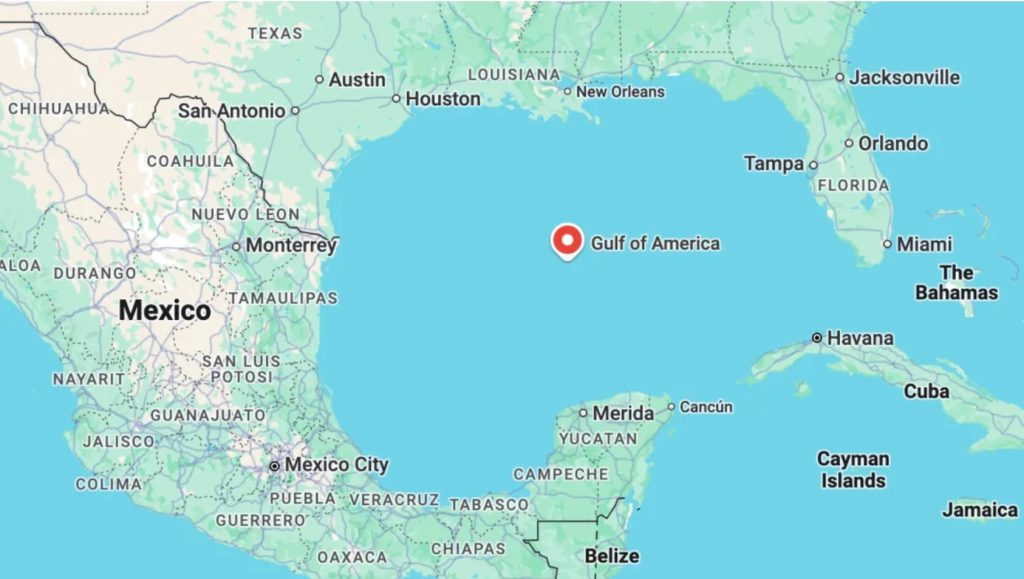
THE BODY OF WATER formerly known as the Gulf of Mexico is now listed on Google Maps as the Gulf of America for U.S. users, Google announced on Feb. 10, 2025.
Issue 1: Gulf of America
Congress.gov: H.R.276, “Gulf of America Act of 2025”
EPA.gov: “EPA Renames Its Gulf Division to Honor the Gulf of America”
WhiteHouse.gov: “Restoring Names that Honor American Greatness”
Google Blog: “Gulf of America Name Change in the United States”
NPR.org: “Who Will Call It the Gulf of America?”
Fox News: “Google Maps, FAA Officially Acknowledge Gulf of America”
Fox News Video: “The View Co-Host on Gulf of America Name Change”
Issue 2: AM Radio
Congress.gov: S.315, “AM Radio for Every Vehicle Act of 2025”
Inside Radio: “Radio Industry Applauds Reintroduction Of AM Radio Bill”
wearebroadcasters.com: “82 Million Americans Depend on AM Radio”
National Association of Broadcasters: “Keep AM Radio in Cars Public Safety”
Fox News: “Officials Sound Alarm on Carmakers Dropping AM Radio”
Washington Post: “End of a Love Affair: AM Radio is Being Removed from Cars”
DISCUSSION QUESTIONS
Issue 1: Gulf of America
- Watch the Fox News video (link above) where a co-host of The View argues that Gulf of America is a more inclusive name because “America” includes both Mexico and the U.S. Do you agree? Why or why not?
- Mexico’s President Claudia Sheinbaum dismissed Trump’s decision to rename the gulf. “For us and for the entire world it will continue to be called the Gulf of Mexico,” she said. Why do you think Mexico opposes renaming the gulf and instead wants to preserve the name as the Gulf of Mexico?
- Why do the names of geographic entities matter to countries? What do map names symbolize to various nations? (e.g., power, culture, historical significance)
- Summarize the arguments for and against changing the name from Gulf of Mexico to Gulf of America. Which position do you agree with and why?
- How do geographic names strengthen a country’s claims to ownership of a certain place?
Issue 2: AM Radio
- What are the arguments for and against congress requiring automakers to include AM radio in new vehicles? Decide where you stand on the issue, then see if you can argue the other side’s position.
- Do you think AM radio will continue to be relevant in the future? Why or why not?
- Automakers say that cell phones are much better at broadcasting emergency alerts than AM radio. With today’s smartphones, is AM radio still necessary? Why or why not?
- According to the Nielsen Company, AM radio listeners tend to be older (about one-third of them are over age 65). As a young person, do you think AM radio is still useful? Why or why not?
- AM radio is free to all drivers of cars that have it. Given this fact, how does AM radio compare to other modes of communication such as cell phone and Wi-Fi reception?
Student Forum Newsletter March 2025
Teacher Spotlight on Will Linser (Bellevue, WA)
Name: Will Linser
School Name: Bellevue High School
School Location: Bellevue, WA (Seattle metro area)
No. of Years Teaching: 27
Subject(s) Taught: AP U.S. Government & Politics, and U.S. History
Grade(s)Taught: 11th and 12th grades
Located just east of Seattle in the verdant Pacific Northwest, Bellevue, Washington, is home to some of the world’s largest technology companies. Amazon was founded in Bellevue by Jeff Bezos in 1994, and today the city hosts satellite offices for eBay, Meta, ByteDance, Oracle, Salesforce, Google, and Microsoft, to name a few.
Teaching and Technology
Perhaps it’s no surprise, then, that Will Linser—who teaches AP U.S. Government and U.S. History at Bellevue High School—says that technology has changed how we teach significantly.
“When I first began teaching, the biggest tech headache was students using pagers,” Linser says, reflecting on his 27 years of experience as an educator. “My, how times have changed, and technology has improved. Now every student has a laptop.”
But for every strength, there is a weakness; they are two sides of the same coin. Technology brings many benefits but also challenges. As tech journalist Nick Carr first purported back in 2008, the internet (and all its distractions) affects our ability to focus. And that consequence has been absorbed by the younger generation, who grew up on technology.
“The biggest challenge is keeping students engaged,” Linser says. “Another change has been being trying to both teach and entertain my students, so that they remain on task and learn.”
Fostering Focus
Most teachers know how frustrating it can be to try to get the attention of a young person watching a TikTok video on their phone in class. This has put additional pressure on teachers. They must not only teach; they must also win their students’ attention.
Linser says his high school recently implemented a ban on student cell phones in the classroom. No doubt other schools around the country have already gone (or will soon go) that route.
“I hope that we can make what we teach more relevant to our students so that they remain engaged,” Linser says. “If our students don’t see what we’re teaching as relevant to their lives, then they just tune us out.”
One way Linser encourages student engagement is by using the SGAP Student Forum newsletter and resources in his classroom.
“I have my students answer the discussion questions for the two issues,” he says. “They are always current and relevant. Answering the questions makes my students think about the important issues facing our country.”
Looking Forward
Linser believes that artificial intelligence will influence the future of teaching. He serves on a professional learning committee that has begun to look at the impact of AI on education.
“It is my hope that we can begin to move to a more collaborative educational experience for our students,” Linser says. “They’ll need that skill in their future careers.”
As a veteran teacher with nearly 30 years of experience, Linser encourages fellow teachers to not be afraid to take risks, even if the effort falls flat. “We’ve all taught lessons that we thought would be a smashing success,” he says. “Well, sometimes things don’t work out as planned. That’s both the fun bit and frustrating part of teaching.”
In fact, Linser says, it’s good to shake things up and not get in a rut. “Try to do at least a few things differently every school year,” he adds. “It’ll be a positive experience both for you and your students.”
Student Forum Newsletter February 2025
Links + Discussion Questions February 2025
RESEARCH LINKS

BIRTHRIGHT CITIZENSHIP is a legal principle under which citizenship is automatically granted to individuals based on place of birth. In the United States, birthright citizenship is guaranteed by the 14th Amendment to the U.S. Constitution.
Issue 1: Birthright Citizenship
Heritage Foundation: “A Fundamental Misunderstanding of 14th Amendment”
Constitution Center: “Revisiting the Birthright Citizenship Question”
American Immigration Council: “Birthright Citizenship”
CNN News: “How Trump Is Banking on 18th Century Laws for Citizenship”
PBS News: “What Is Birthright Citizenship and Could Trump End It?”
Reuters: “Biden Says Awful that Trump Seeks to End Birthright Citizenship”
Issue 2: Daylight Saving Time
Congress.gov: S.582, “Sunshine Protection Act”
TimeandDate.com: “What Is Daylight Saving Time?”
AASM Sleep Education: “Daylight Saving Time Resources”
Farmer’s Almanac: “Daylight Saving Time 2025”
National Conference of State Legislatures: “DST State Legislation”
Encyclopedia Britannica: “Daylight Saving Time News”
DISCUSSION QUESTIONS
Issue 1: Birthright Citizenship
- After reading the Issue One page of the newsletter, what are your views on the issue of birthright citizenship?
- Are you for or against ending U.S. birthright citizenship for the children of undocumented immigrants? Why? Justify your answers with arguments.
- Do you feel that undocumented immigrants take advantage of the current U.S. policy on birthright citizenship? Why or why not?
- Were you aware of the issue before reading these materials? Had you formed an opinion? If so, has your opinion changed? Why or why not?
- What are the costs of maintaining the current policy on birthright citizenship for children born in the U.S. of undocumented immigrants?
Issue 2: Daylight Saving Time
- Should the United States make daylight saving time permanent year round? Why or why not?
- Visit https://savestandardtime.com/ and read the arguments for permanent standard time. What are the benefits and drawbacks of the proposal?
- How does “springing forward” and “falling back” affect you personally? Which time zone do you prefer and why?
- Why do you think some states opt out of daylight saving time?
- Compare and contrast the economic advantages and disadvantages of daylight saving time with those of standard time. Is daylight saving time better for the economy overall? Explain your answer.


